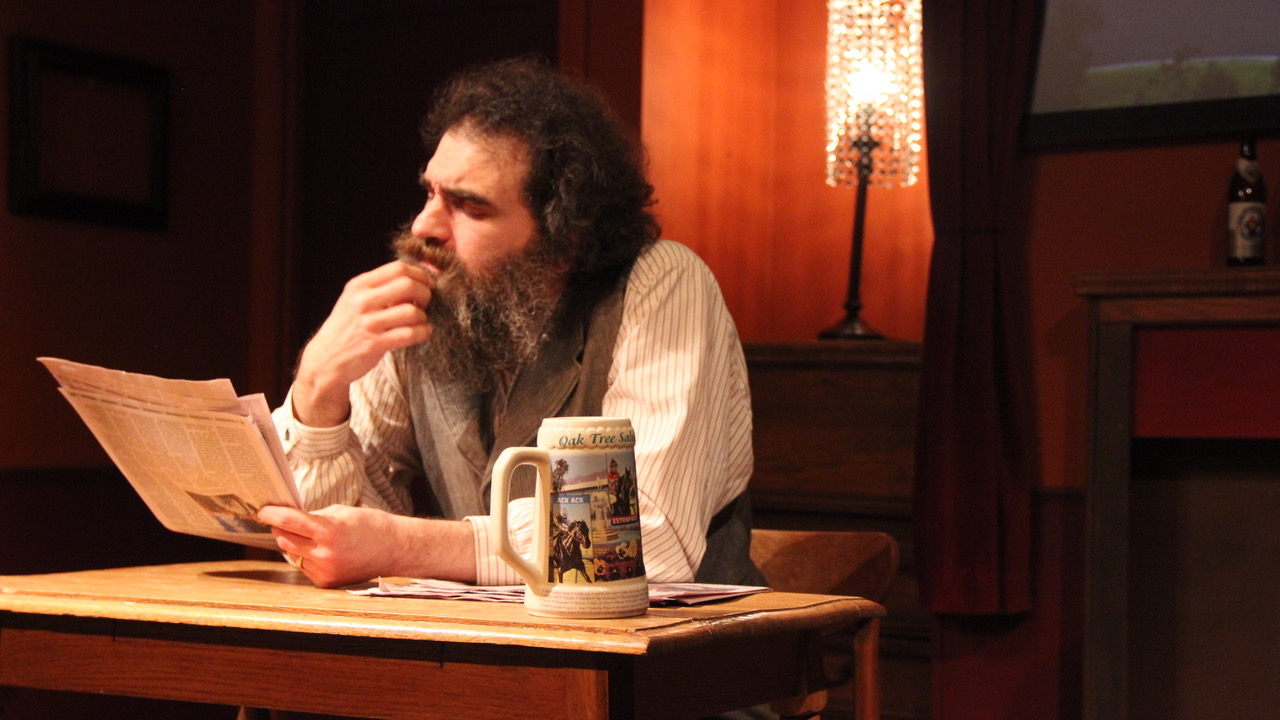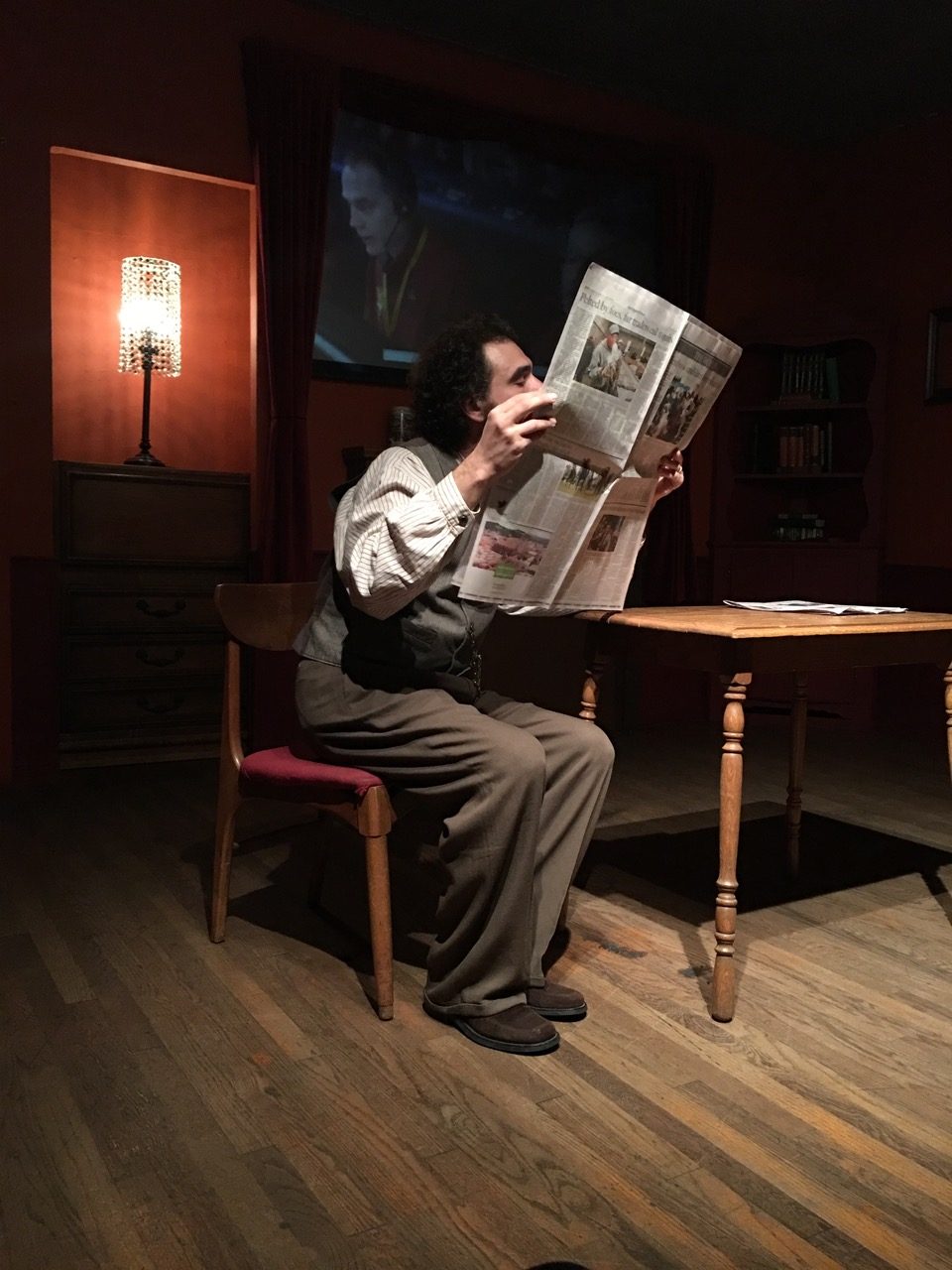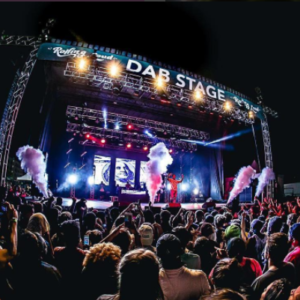 View Winners →
View Winners → 

Photo Courtesy of Anson Petrick
Cue strings. The stage sits ready, a table and chair empty but expectant. Beethoven’s “Egmont” Overture croons, almost menacingly, with a kind of harrowing regality affixed to the tone of a large TV displaying a montage of recent news. Video clips of post-hurricane footage, baby monkeys, recent history’s deadliest fires, Trump, Bitcoin – having their own kind of crescendo – flash in a flurry of words and images from the likes of CNN, Fox, and Vice.
Gera Hermann steps out as Karl Marx, his face hidden behind an opened copy of the LA Times; the most notable headline reads, “Pelted by foes, fur traders call it quits.”
As if sitting in Marx’s living quarters, the silent audience looks on as Hermann sits with legs crossed, casually tapping the toe of his suede loafers, flipping through the various sections of the newspaper. Finally, the eight-minute overture reaches its end. The paper is folded and placed on the table. And our eyes finally see the face of Marx himself.
“Thank God, an audience.”
So begins the opening night of The Social Stage’s debut, Marx in Soho.

Photo Courtesy of Anson Petrick
Ye’ela Rosenfeld is the mastermind behind this new theater company, who has partnered on its inaugural production with Actors Art Theatre, a breath away from LACMA on Wilshire Boulevard. The 32-seat theater welcomed Marx in Soho to a sold-out weekend residency, filled with curious attendees and abundant theoretical ignition around the oft-misunderstood German philosopher.
From the onset of this dream, Rosenfeld has received overwhelming support from the community as well as in the world of academia, with many esteemed professors and scholars spreading the word and donating their time to sit in on the post-show expert panels.
Rosenfeld, who has previously executed works by the likes of Vaclav Havel and Jean-Paul Sartre, chose Howard Zinn’s one-man play as the first taste of what’s to come for this theater company with a big vision “to bring quality and free academic learning to all people.” The deprivation and need for these forms of thought-evoking art are evident, and Zinn’s play was chosen as the ideal pilot to begin this new form of experimental theater. Aiding in the visual execution is Production Designer Sarah Smalik, who created a lived-in space and soundtrack that calls back to 19th century while blending the focus of modern society through the multidisciplinary elements such as the television and recent Los Angeles Times publication.
https://www.instagram.com/p/Bv77dNCF7q-/
Starring in Marx in Soho is Gera Hermann, who has worked with Rosenfeld before on her adaptation of Friedrich Dürenmatt’s The Physicists at Hollywood Fringe Festival. His execution of Marx’s eccentricities is uncanny, time seeming to cease as he speaks about his misunderstood theories and contemporaries such as Friedrich Engels. With the gravity-defying beard and hair a near mirror image to the scholar, Hermann’s inflections are rich and inquisitive. He quotes himself, paces, pours a hefeweizen into his stein, contemplates nostalgia, jokes about his own taboo representation, and alludes to modern policy and society. “And they say my ideas are dead,” Hermann looks to the crowd, as if for approval, then shrugs.
Throughout the performance, bouts of laughter spill out of the audience, the chairs squeaking along gleefully with their giddy spasms – their engagement still just as profound during the more solemn, inward-looking moments of the Marx prophecies being explored.
The most striking moments, however, are not so much in the sarcastic divulsions, but in Hermann’s portrayal of Marx as any other man. Any other man who admires and adores his family, particularly his wife Jenny von Westphalen and her “ponderous, unsparing, honest critiques” as he describes her involvement in his process. Any other man that takes everything personally, that is afraid to be criticized, he admits. Any other man that looks to his children, awe-stricken and dumbfounded as Marx was, particularly by Eleanor, lovingly called Tussy, his youngest child to survive infancy (as four of his children did not) and later become a social activist herself.
https://www.instagram.com/p/Bv5B4jflx5U/
Regardless of the premeditated theories that the audience may or may not have had, by the end of the show, everyone was keen to explore more of Zinn’s vision of Marx, as well as much of how Marx and Zinn’s visions respectively are still relevant today.
For opening night, Dr. Sina Rahmani (self-acclaimed “amateur marxist” and creator of The East is a Podcast) helmed the salon discussion after a brief intermission with wine, cheese, and other snacks. Slowly each seat was again filled as the eager spectators were interested learning more, as well as inserting their own thoughts and ideas of Marx and how his ideas and predictions are playing out today.
It is the hope of The Social Stage that audiences will get a chance to learn in a way that is not as frontal, with works that organically ignite discussion rather than simply shower viewers in one-sided perspective. Additionally, with the pay-what-you-can system for tickets, everyone has the opportunity to attend and participate in this thoughtfully ambitious creative community.
The various closing thoughts as the theater slowly emptied at the end of the night are almost as if visible in the front of everyone’s minds: the possibility of choice, nothing is certain, anything could happen.









































































































